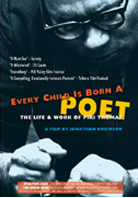
Every Child is Born a Poet: The Life & Work of Piri Thomas 2003
Distributed by When In Doubt Productions, Inc., 230 Everit St., New Haven, CT 06511; 203-777-1690
Produced by Jonathan Robinson in association with the Independent Television Service and Latino Public Broadcasting
Directed by Jonathan Robinson
DVD, color and b&, 59 min.
Sr. High - Adult
Biography, Literature, Poetry, Multicultural Studies
Date Entered: 03/25/2005
Reviewed by Brian Falato, University of South Florida Tampa Campus LibraryJohn Peter “Piri” Thomas was born in 1928 in New York’s Spanish Harlem. He got involved with gangs as a youth and became a drug addict. In 1950, he received a 5 to15 year prison sentence for his part in a botched robbery attempt at a New York City nightclub. While in prison, he discovered writing as a means of self-discovery. Paroled in 1957, he went to work at a baking company and began serving as a counselor in Spanish Harlem. He published his first book, the autobiographical novel Down These Mean Streets, in 1967 to national acclaim. Three more books followed.
Every Child is a Poet tells the story of Thomas’ life and shows his twin passions of writing and counseling. We see him working with youthful offenders both in archival footage and in material shot for the video. And we hear samples of his poetry and prose.
The literary segments are presented in various ways. Thomas reads his poetry while being photographed in stylized black and white. Reminiscences of his childhood feature Thomas’ voice while kids reenact what he is reading. A humor-tinged story about the young Thomas taking a quarter from a table in the family’s apartment not only has the author narrating the story, but also appearing as all the characters: Thomas as a child, his father, and his mother. And it’s all played out against cartoon backdrops.
In the most compelling vignette, actors dramatize a scene in which Thomas argues with his brother over the African heritage in the family’s Puerto Rican background. Thomas’s character says most whites would consider the Thomases racially as black, while the brother angrily denies the African connection.
Scenes such as this one are intense and contain some profanities. But Thomas’ story deserves a wide audience, and this video is recommended for high schools, colleges, and the general public.